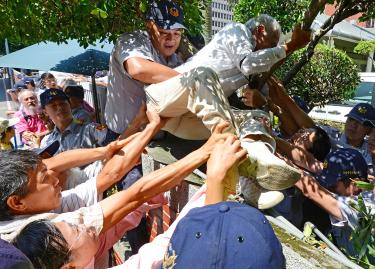A public opinion poll released yesterday showed that most people support fair trade and cross-strait trade liberalization, but lack confidence in the capability of President Ma Ying-jeou’s (馬英九) administration to safeguard Taiwanese interests in its engagement with China.
The survey, conducted by Taiwan Indicators Survey Research (TISR), asked respondents about their views on a recently signed service trade pact between Taiwan and China. It found that 58.7 of respondents supported Taiwan’s pursuit of economic partnership agreements in general; only 16.5 percent did not support the move and 24.8 percent declined to answer.
However, opinions were divided on cross-strait economic relations, with 43.3 percent of respondents saying they believed Ma’s push for cross-strait trade liberalization would improve Taiwan’s competitiveness, while 34.3 percent said the president’s policy would increase the nation’s economic dependence on China.
The survey also found that 42.7 percent of respondents thought the service trade agreement was unnecessary — almost 10 percentage points higher than the 32.6 percent who supported the pact — while 24.7 percent said they had no opinion.
A further breakdown of the poll data showed how opinions were divided along political lines, with 57.9 percent of pan-blue supporters favoring the pact and 72.5 percent of pan-green supporters opposing the deal.
Opinions among those who identified themselves as independent voters were more balanced: 40.4 percent disapproved of the pact, against 27.2 percent who supported it.
Public confidence in the Ma administration’s ability was also low, with 62.3 percent of respondents saying they did not believe the government would be able to reduce the adverse impact of opening the domestic market to China and to safeguard local industries’ interests. Only 21.6 percent of respondents expressed their confidence in the government, while 16.1 percent gave no answer.
According to TISR, the percentage of respondents who said they were confident about the Ma administration’s capability to deal with the impact of cross-strait trade liberalization dropped by 9.1 percentage points compared with a poll conducted in 2009, when Taipei began negotiations with Beijing over the Economic Cooperation Framework Agreement (ECFA).
At the same time, the number of people who were doubtful of the government’s capability to deal with the issue increased by 13.1 percentage points, TISR said in a press release.
The survey also found that Premier Jiang Yi-huah’s (江宜樺) approval rating of 17.7 percent was the lowest since he assumed the post in February, while Ma’s disapproval rating remained dismal at 70.7 percent.
The survey, conducted from July 24 to 26, collected 1,008 valid samples and had a margin of error of 3.1 percentage points.
Source: Taipei Times - 2013/07/31





















